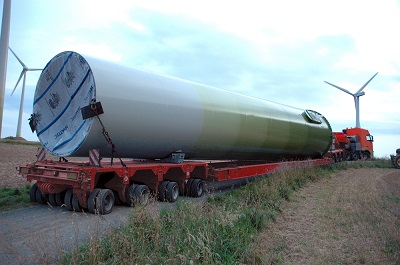The Renewables Revolution
Jeanette Shoebridge, Renewables Manager for GAC U.K., discusses best practice for companies offering logistics support to the U.K.’s expanding renewables sector in the North Sea.
North Sea brings promise to U.K. renewables sector
Interest in the North Sea U.K. renewables sector continues to rise due to Levy Control Framework (LCF) support and government funding putting the UK in a strong position to be a global leader in the development of offshore renewable energy, with the necessary industrial base, research capability, regulatory framework and supply chain in place to lead the sector.
Logistics services play an important role in offshore support and are required for a multitude of purposes. Our efforts to meet the growing demand for support in the renewables sector is now being spearheaded by our team based in Great Yarmouth; from installation, to on-going support and maintenance, our strategically located offices are critical in ensuring we provide efficient support where it is required.
Going the distance
The U.K. government is keen to expand the renewables sector, despite increasingly stringent regulation requiring newer farms to be erected further offshore in deeper water, making installation more challenging, increasing cost and extending delivery deadlines.
Logistics providers need to invest in strategic, alternative solutions to mitigate the challenges of growing the renewables sector further offshore. It is necessary to calculate the additional time needed, if there is the potential for delays, and then provide an integrated support package tailored to their client’s needs.

Supply chain players have cited the growing skill shortage, which is likely to grow as the industry expands as a significant concern. Greater investment in training is urgently required to ensure the U.K. delivers a skilled workforce capable of building their offshore supply chain.
Training centers with the highest standards in excellence, similar to those supporting the nuclear industry, need to be established, ideally in regions where skills and experience in offshore oil and gas can be utilized to accelerate the learning process. GAC has established excellent relations with Ireland’s National Maritime Training College in Cork, to ensure staff is equipped to handle all procedures as safely and efficiently as possible.
The need for speed and flexibility
Means of gaining access to offshore wind farms should be tried, tested and well understood. Workboats are relatively inexpensive and can carry significant numbers of technicians, however response times and accessibility are limited by transit time and sea state. There are other alternatives such as helicopters, which can respond quickly, but are also relatively expensive and cannot carry more than a few technicians and very little equipment.
When choosing the best transport methods, logistics providers need to liaise with all necessary contacts to establish ‘transition points’ – the distance from port at which the lowest cost strategy changes from one transport method to another. Logistics branches servicing offshore renewables should also offer a comprehensive range of facilities, such as quays for support vessels, project logistics and warehousing, so they can propose a range of flexible solutions.
Managing costs and specialist equipment
Specialist equipment and vessels not only increase costs, but are also less readily available and more challenging to procure. There has been a lot of investment in purpose-built vessels for the renewables industry over the last few years and we have also seen a strong trend developing with offshore vessels being converted or put to use in the renewables industry. Specialized providers can add value if they recognize the need to adapt and work within the current market state.
Outsourcing specialist vessels or equipment can also provide a cost-effective way to deliver cost savings across supply chains, as well as ensuring high quality solutions. One example of this outsourcing model at work in the North Sea is the recent announcement of GAC launch services in Aberdeen, which transports crew and spares to vessels on lay by anchorage locations in the area.
Thorough project planning is key to the successful logistics operations, and nowhere more so than offshore where consequences of poor planning are more palpable than on-shore. We understand that even the smallest of delays can severely impact schedules and put further pressure on strained budgets. We believe it is imperative to involve all parties concerned from the earliest stages of planning, and throughout the duration of the entire logistics process, in order to effectively manage timings and costs.
What the future holds
The offshore renewables market faces numerous challenges and there is an urgent need for technological expertise, grid infrastructure improvements and more funding to ensure projects expand successfully. We believe a combination of factors within logistics teams such as local expertise, available workforce and deep-water facilities enable providers to give unrivalled response, flexibility and ultimately deliver cost savings to their customer base.
The products and services herein described in this press release are not endorsed by The Maritime Executive.

